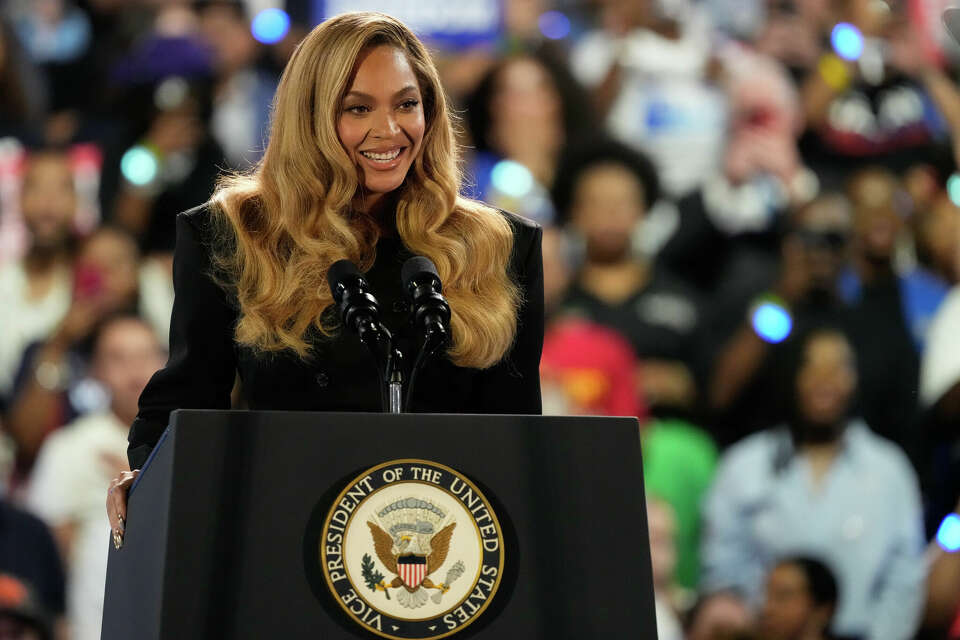Despite high-profile endorsements from A-list celebrities like Taylor Swift, Beyoncé, and a host of Hollywood stars, Kamala Harris faced a crushing defeat in the US presidential election. It was Donald Trump and the Republicans, bolstered by a coalition of hypermasculine influencers, who triumphed in what was seen as a cultural battleground, despite their lack of star power in comparison. The election results have raised questions about the real impact of celebrity endorsements and whether Hollywood’s backing was truly influential in the voting booth.
Celebrities have long been a fixture in U.S. elections, from Frank Sinatra’s support for John F. Kennedy to the high-profile fundraising campaigns of the modern era. This year, stars such as Taylor Swift, Beyoncé, George Clooney, and Harrison Ford rallied behind Harris, using their platforms to raise awareness and funds. But in the end, their influence in swaying votes appears limited. As Laurence Maslon, a professor of arts at New York University, noted, “People probably realize that Beyoncé and George Clooney don’t have to worry about the cost of gas or the price of eggs — so maybe they’re irrelevant.”
While celebrity endorsements help raise millions of dollars and generate attention, their effectiveness in directly influencing voters is a different matter. Arizona State University professor Margaretha Bentley, who teaches public policy with a focus on Taylor Swift’s political impact, pointed out that the impact of celebrity endorsements has always been mixed. “It’s never going to be the golden ticket everyone hopes for,” she said.
The Limits of Celebrity Influence
Mark Harvey, author of Celebrity Influence: Politics, Persuasion, and Issue-Based Advocacy, also cautioned against overestimating the power of celebrity endorsements. “There isn’t a strong science behind this idea that celebrities can influence people to vote for candidates,” Harvey explained, noting that famous supporters tend to have the most impact when advocating on issues where they are seen as experts — something that doesn’t always translate to broader political influence.
Trump’s victory speech, delivered the morning after the election, highlighted the key role of his supporters in the world of sport, business, and entertainment. UFC President Dana White was celebrated as a tough figure, while Trump also lavished praise on golfer Bryson DeChambeau and tech mogul Elon Musk. The Republican candidate received a last-minute endorsement from podcast giant Joe Rogan, whose influence in the realms of masculinity and “traditional” values resonates strongly with Trump’s base.
Experts argue that these endorsements from hypermasculine figures may have appealed to voters in an election shaped by cultural issues, with a strong emphasis on identity and masculinity. Harvey noted that the “be a real man” rhetoric, championed by figures like Joe Rogan, resonated with many voters who felt disconnected from what they saw as the more elitist, liberal-leaning Hollywood establishment. “This ‘macho’ appeal is powerful in an election where cultural issues played a dominant role,” he said.
Celebrity Influence: A Double-Edged Sword
For the Democrats, the outcome was a sobering moment for reflection. Bentley suggested that the party will need to engage in a “deep self-analysis” of their campaign strategies and consider whether the celebrity endorsements were effective. Despite their failure to shift the electoral outcome, celebrity efforts did drive other forms of engagement. Ashley Spillane, author of Celebrities Strengthening Our Culture of Democracy, pointed out that celebrities like Taylor Swift were successful in encouraging overall civic engagement. Swift’s endorsement of Harris, in particular, was credited with driving 400,000 people to a voter registration site — a testament to the power of stars in motivating people to participate in the democratic process, even if they didn’t directly influence voting preferences.
Despite their failure to deliver victory for Harris, Hollywood stars were vocal on social media, expressing frustration with the election results. Oscar-winning actress Jamie Lee Curtis lamented that Trump’s win would lead to “a more restrictive, some fear draconian time.” Actor John Cusack ominously predicted that the result might signal “the last free election” and a return to “fascist” governance. Rapper Cardi B, who had supported Harris and appeared at a rally just days before the election, expressed her frustration with a simple post: “I hate y’all bad.”
The Bigger Picture
While celebrity endorsements can help mobilize voters and raise funds, their ability to shift actual voting behavior remains limited, especially when voters are deeply driven by cultural identity and issues that celebrities may not fully connect with. Trump’s victory underscores the power of a different kind of cultural influence — one that appeals to masculinity, populism, and anti-elitism, themes that celebrities from Hollywood often struggle to relate to.
In the end, the election highlighted that while celebrities may generate excitement, they are not the deciding factor in an election driven by broader cultural, economic, and political concerns. For Democrats, the challenge moving forward will be to understand how to connect with voters on a deeper level beyond star power, and to recognize that the issues that resonate most with voters may not always align with the concerns of Hollywood.






